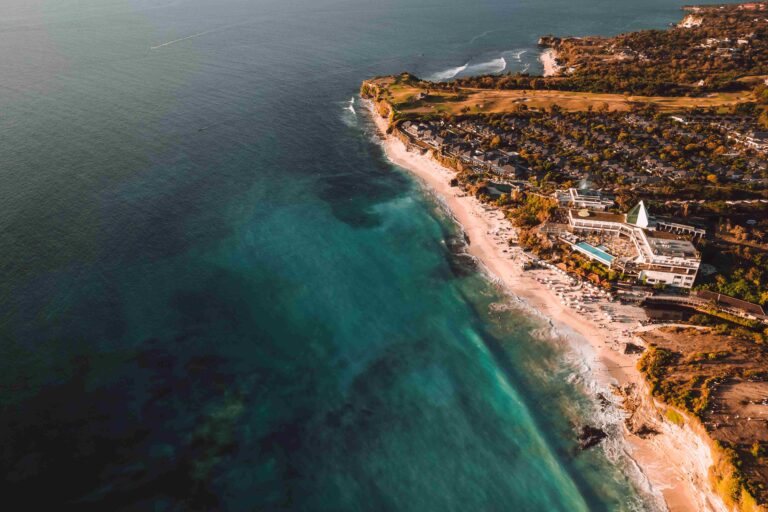Bali is one of the most popular places for digital nomads to work from in Southeast Asia. There are coworking spaces galore, and the visa regime is relaxed enough to make it reasonably easy to stay on the island for a few months without too much hassle.
But before you decide to move to the island and be a digital nomad, you should read our in-depth guide to being a digital nomad in Bali – it’s got everything you need to know to make the right decision about your remote work.
Why Do Digital Nomads Choose Bali?

If there’s anything we know for certain about digital nomad life in Bali, it’s that people come here for a lot of great reasons. That doesn’t mean that there aren’t some drawbacks to living on the island, and we’ll come to those in a bit, but first, let’s look at the big joys of Bali from a nomad perspective.
Bali’s Beaches

ali has some of the most beautiful beaches in the world. It has a wonderful mix of those postcard-perfect white sand beaches in places like Sanur and Nusa Dua, as well as the amazing black sand beaches of areas like Amed and Canggu.
It’s easy to write off black sand beaches as “not as pretty”, but anyone who does that hasn’t seen a black sand beach at sunset, when the water has recently washed over the sand. The spectacle in the sky is reflected on the sand below, and it’s one of the most captivating sights on Earth.
Balinese sunsets are famous throughout the world, and it’s the sunsets in places like Canggu that fire the imagination. We would note that if you go to Amed, however, you’ll need to get up early and watch a similar show at sunrise – Amed is on the wrong side of the island for amazing sunsets of any kind.
You’ll find many surf schools around the most popular beaches where you can take surf lessons and set yourself up to challenge the island’s waves. There are also surfing equipment hire shops, so you don’t need to bring a board to Bali to enjoy the sport.
Other water sports are also popular, and the two main hubs for water sports are Tanjung Benoa and Sanur. Both of which can be reached on day trips from the most popular nomad areas in Bali.
Bali’s Natural Beauty

Moving on from the gorgeous beaches, we turn to the aesthetic appeal of this paradise island, and there’s no doubt that Bali is a place of endless natural beauty.
Start at the lush rice terraces and rice fields, which can still be found in a busy beach town like Canggu if you look hard enough, but which cover much of the island once you get a bit further inshore.
These are all part of the “subak system”, which is Bali’s only UNESCO World Heritage site and a testament to a unique form of hydroengineering and agriculture that saw the Balinese live in perfect harmony with their natural environment for over 1,000 years!
Then, head into the jungle for a hike, climb a volcano for a spectacular view, or visit one of the island’s many waterfalls. You might also want to check out West Bali National Park, which is an area of outstanding beauty where the tropical nomad can get away from other digital nomads and enjoy all the nature that Bali has to offer in one place.
We’d also encourage you to get into the water, as much of the most beautiful natural world here is beneath the waves. Bali is a great place for deep-sea diving and scuba diving alike.
Balinese Culture And “Bali Life”

One of the biggest draws about Bali when compared to the rest of Indonesia is the local culture.
While Indonesia is a majority Muslim country (though there are 5 official religions of Indonesia and a sixth that exists in a grey area of legal recognition), Bali is a majority Hindu enclave in the archipelago.
This gives the island a unique culture (it’s also the only Hindu majority area in Southeast Asia) and tends to be more relaxed about things like drinking and partying than the rest of the country.
However, we would point out that the Balinese are still quite conservative at heart, and it pays to read up on the culture here and to follow the basic guidelines laid down by the Balinese government on proper behaviour, etc.
And Bali life is famously laid back and easygoing. Whether you spend your time in coworking spaces or on the beach working from your laptop, there’s a chilled vibe to this place that’s hard to replicate elsewhere.
Relatively Low Cost Of Living

If we’d written this piece a few years ago, we’d have said “Bali is cheap”, but that’s not quite the case anymore. You will find most things still have a cheaper price tag than they might have done in your home country, but things are getting more expensive in the post-pandemic world.
You can no longer rent a villa in Canggu for $500-$1,000 USD ($750-$1,500 ADU) a month (double that budget and you’re getting closer to the mark) but you can still get a room in a guesthouse with a private bathroom for $450 USD (about $675 AUD) a month.
A guesthouse is also often a good place to meet other remote workers, though you may have a little less outdoor space than you would at a villa.
Food is cheap, tasty and plentiful, and a meal in a local warung might cost as little as $2 USD ($3 AUD), $3 USD ($4.50 AUD) including a drink.
Alcohol is not cheap, however, though it is cheaper than in most Western nations, and imported goods tend to be more expensive in Bali than in other countries in this region.
However, if you want to be a digital nomad in Bali, you can get by on $1,000 USD ($1,500 AUD) a month and with $2,000 USD ($3,000 AUD) a month, you can have a very good time still.
What Might Prevent Digital Nomads From Choosing Bali?
There are also some reasons that might see nomads opting to pursue nomadic living in other locations than Bali and these include:
Time Zone

Bali is currently at GMT (Greenwich Mean Time) + 8 hours, that is the same time zone as Beijing. That means we’re 8 hours ahead of the UK and about 12-16 hours ahead of the USA we’re also a few hours behind some parts of Australia.
This may be no big deal if you don’t mind getting up at the crack of dawn (or even before dawn) or working all the way through the night and sleeping in the day.
But for many digital nomads keeping up with a different time zone, when there’s a substantial time difference between the time zone you live in and the one you work in, is exhausting.
The author of this piece tried working on USA time while living in Shenzhen, China. The experiment did not end well. Meetings at 4 a.m. are just no fun.
Inflation

Then there’s the rapid rate of inflation. Even if you find your budget is barely enough for Bali today, wait until tomorrow comes around and the prices all jump up.
The rate of inflation has slowed a little since the peak post-pandemic, but we find that prices rise constantly here, and things like coworking spaces, which already charge a decent premium in most cases, can see large rises in fees almost overnight.
Traffic
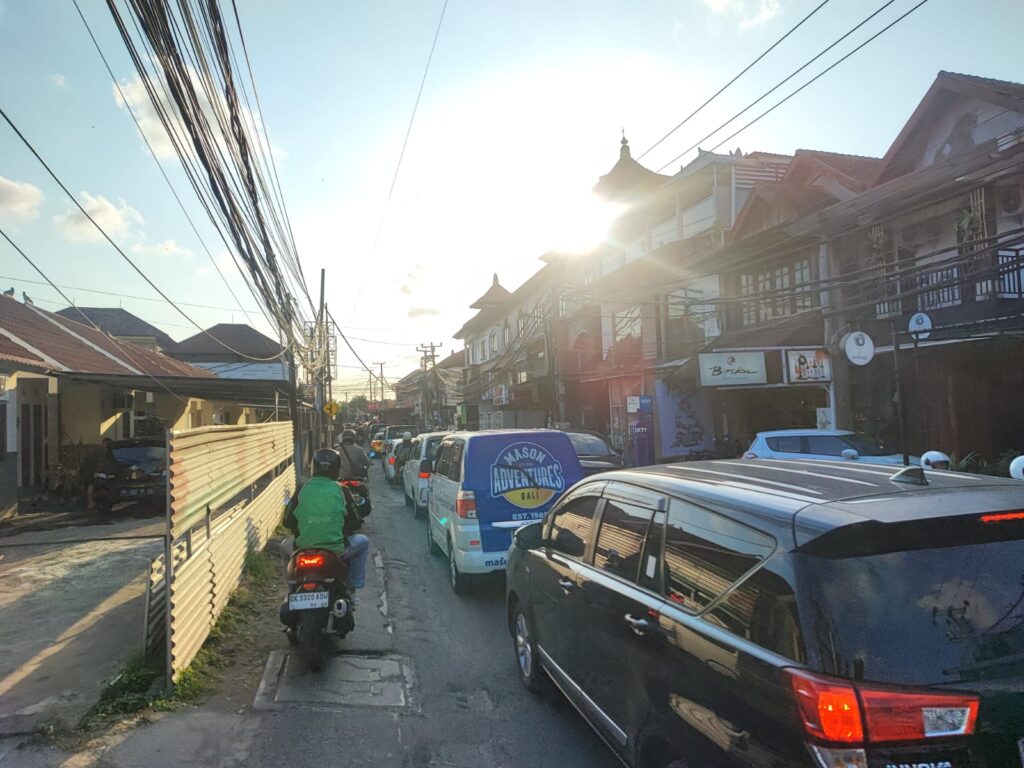
Finally, there’s the biggest issue in Bali for most visitors and locals, not just the digital nomad in Bali – traffic.
The traffic here, especially during peak hours, is very heavy, indeed. What ought to be a 20-minute journey according to the map can take 2-3 hours or more at the worst times of year and day.
Even at the best of times, you can find a 10-kilometer journey can take up to an hour. We find the trick is to live near the places you most want to be and then only travel when you need to. But for some folks, the traffic here is a deal breaker.
How To Get To Bali And Enjoy The Digital Nomad Lifestyle

From a practical perspective, unless you are coming from the Eastern tip of Java (in which case you can get on a ferry), the only real way to arrive in Bali is by plane.
And there is only one airport here in Bali – Ngurah Rai International Airport, also known as Denpasar Airport (DPS). It’s in the capital city, Denpasar.
You can get a cheap ride-share using the Grab or Gojek apps from the airport to any part of the island on arrival, and it won’t cost too much, even if you want to go all the way to West Bali.
We would note that you will need the following documents to enter Bali:
A valid and undamaged passport – Indonesian immigration famously rejects people who try to enter on damaged passports, and you will need 6 months’ validity on your passport, ideally from the date that you are projected to leave Indonesia
A return flight ticket – we’ve never been asked to show this in Indonesia, but you might be required to show that you have onward travel plans
A fully completed medical form – there is currently a requirement for you to complete a health questionnaire online (it’s free) and show this at the airport; if you don’t do it in advance, you can fill it in at the airport instead.
A fully completed customs form – this is a permanent requirement for visiting Indonesia. The good news is that it’s easy to complete and can be done online before you land or after you get here.
A visa – this can be purchased online either through the government portal or via an agent, depending on the type of visa you need or most nationalities can buy a tourist visa on arrival at the airport
The Bali tourist tax receipt – in addition to the visa fee, there is an additional fee for the Bali tourism tax, which you can pay this in advance online or at the airport after you clear customs. If you don’t pay this fee, you may find that you cannot leave Bali when you arrive at the airport on the way out.
Where Do Digital Nomads Live In Bali?
There are coworking spaces all over Bali, and you will find digital nomads don’t stick to any particular part of the island, but there are two places with large digital nomad communities, and they are Canggu and Ubud.
Canggu – One Of The Most Popular Destinations With Tons Of Coworking Spaces
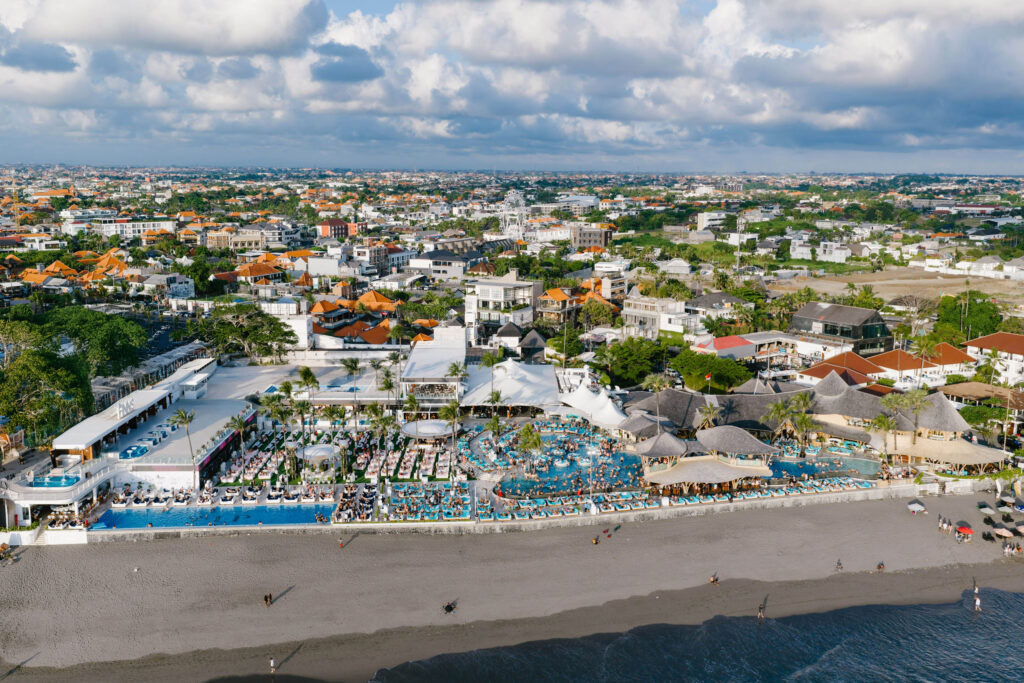
Canggu comes second only to Chiang Mai in Thailand as the biggest draw for digital nomads in Southeast Asia. If you want to be a first-time digital nomad in Bali, your first stop will probably be Canggu.
It’s home to the world-famous FINNS Beach Club, as well as having some of the best beaches to learn and improve your surfing skills on the island. There are still traces of the rice paddies and fields in the area too, and it has all the modern conveniences that make digital nomad life easy.
Remote workers will also be delighted to find that Canggu has an abundance of coworking spaces, and however you like to work, you can be sure it will be accommodated in Canggu.
The only downside of Canggu is that it is the most popular spot in Bali now, and that means it’s more expensive than it used to be. But most Bali digital nomads will tell you that it’s a must-do spot before you explore the rest of the island.
Ubud – No Beaches But Affordable Accommodation And Awesome Local Food

Ubud is the spiritual heart of Bali. It’s also inland, so there are no beaches to enjoy. However, there are plenty of coworking spaces and digital nomads are often attracted to its cooler climate and cheaper accommodations.
The town is much busier than it once was, however, and prices are rising in Ubud, though not quite as rapidly as they are in Canggu.
Ubud’s coworking spaces might be the ideal place to start your digital nomad experience in Bali if you’re looking for a hippy-style crowd.
The area has lots of things to see and do, including some of Bali’s best temples, waterfalls and museums, and its dining scene is excellent, particularly for warung-style food and vegan/vegetarian food.
Uluwatu – A Surfer’s Paradise

Uluwatu is an odd place for nomads. It’s ideal for the kind of nomad seeking solitude where they can work from their guesthouse or villa a and then go surfing afterwards.
The area is very spread out, and while there are cafes, pubs, etc. they can be hard to get to just on a whim.
However, there’s no doubt that it’s the island’s top surfing destination and the would-be professional surfer has to spend some time here.
Sanur – A Relaxed Vibe
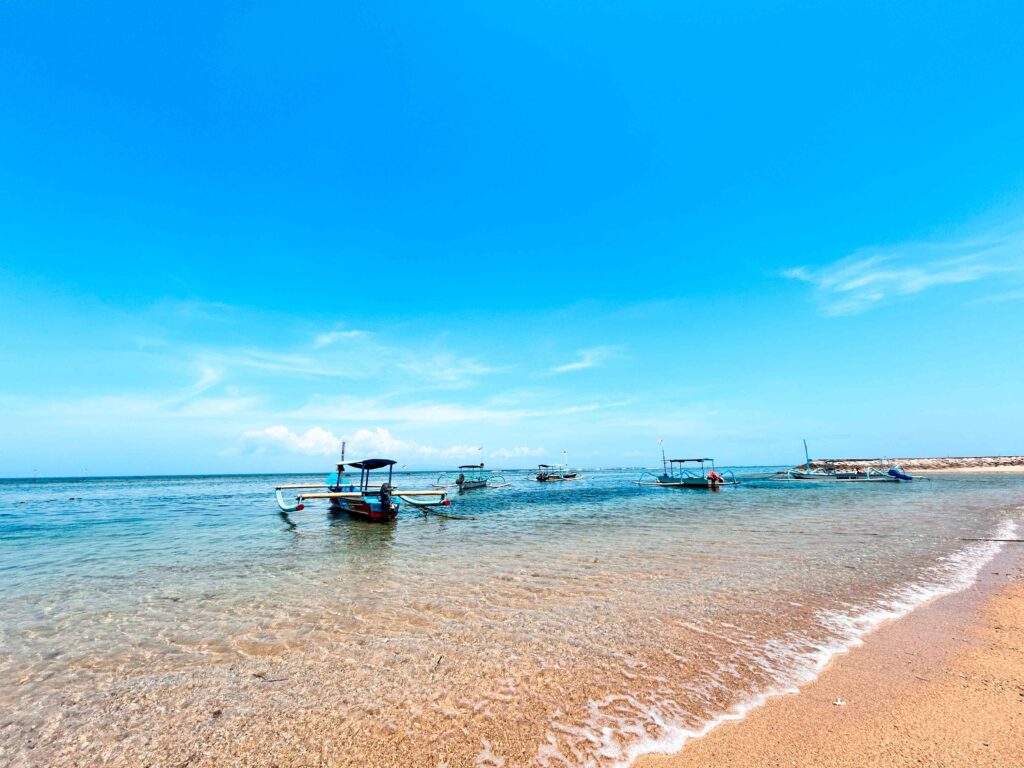
If you’re not into parties but don’t fancy the solitude of Uluwatu, then you might go to Sanur.
It’s a beach town on the opposite side of the island from Canggu, Seminyak, etc., and it has spectacular sunrises.
The ocean here is very much for swimming in, and the overall vibe of Sanur is laid back and relaxed. But it’s an easy area to walk around and there are plenty of coworking spaces, cafes, restaurants and social opportunities too.
Amed – Breaking Out Of The Mold
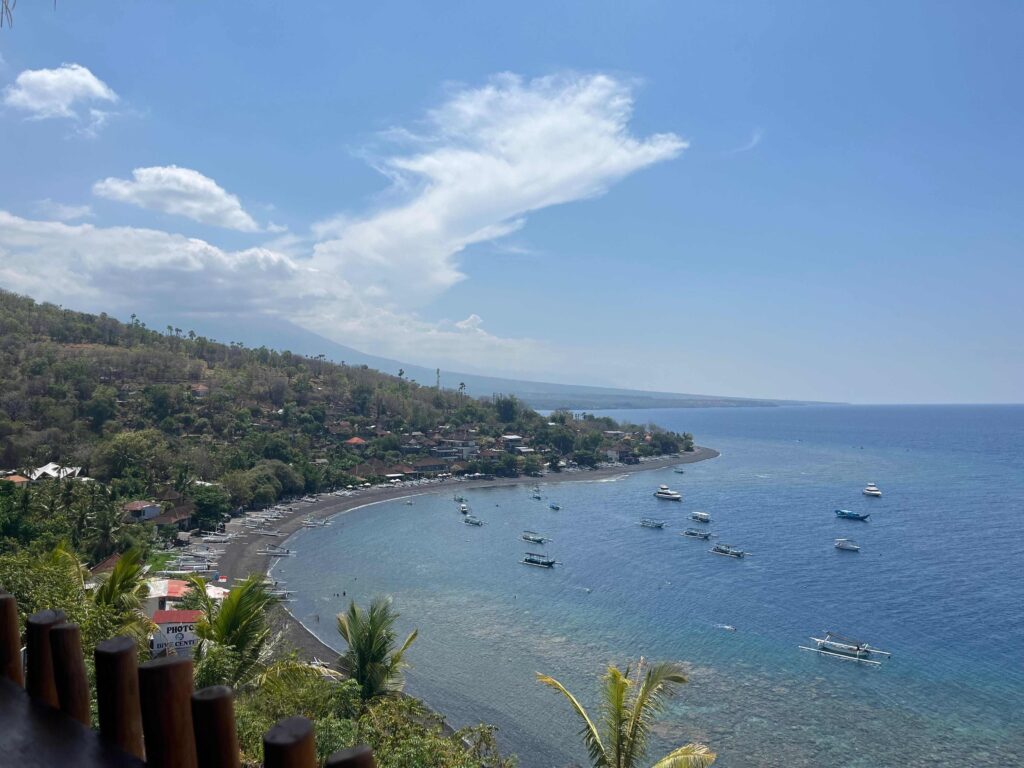
Amed is definitely up and coming thanks to the incredible diving opportunities in the area.
Nomads who want to live cheap and experience the “real Bali” might just want to head to Amed.
There are few coworking options and cafes, bars and restaurants, but there are enough that you’ll be able to get the work done.
Digital Nomad Visas
One thing every digital nomad and, indeed, visitor to Bali will need is a visa and it’s important to get the right one for your needs.
Is There A Digital Nomad Visa?
Yes, Indonesia launched a digital nomad visa during the pandemic though it didn’t actually become available until recently.
However, this visa may be difficult to obtain for many digital nomads as it requires a high minimum income and it’s quite expensive.
The good news is that it’s a multiple entry visa which means you can come and go from Bali as you please.
The basics of this visa (an E33G Visa, to be precise) are that you will need to spend approximately $1,000 to secure it. It lasts for a period of 1 year. And enables you to carry out assignments for a company based overseas and carry out any touristic activities you see fit.
You cannot stay in Indonesia after the visa expires, work for local businesses or sell goods and services in Indonesia.
In addition, you must prove you earn at least $60,000 USD a year, a employed by a company, have a copy of the incorporation certificate of that company, and personal bank statements with either $2,000 minimum balance over the last 3 months if you bank offshore or $5,000 if you bank in Indonesia.
What Visas Are Most Digital Nomads Using?
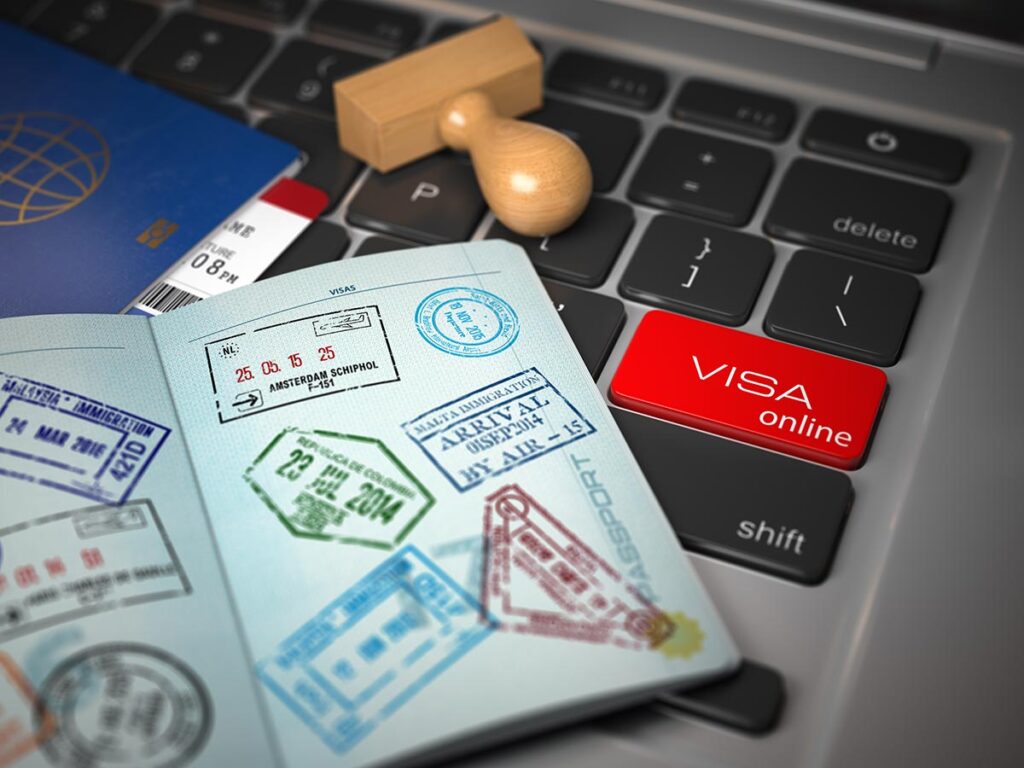
Given that the digital nomad visa is a pain to secure. Most nomads either stay for short periods and use a standard tourist visa (which is valid for 30 days and can be extended for another 30 days) or a 211A social visit visa which is good for 60 days and can be extended twice for an additional period of 60 days each time (giving 180 days in total).
These visas are cheaper and easier to arrange (a local agent can help with a 211A if you don’t have the proofs required to process your own) but they are single entry (which means if you leave the country, you need a new visa) and don’t allow you to legally work in Bali.
At the moment, the authorities seem to be turning a blind eye to nomads on these visas. We cannot offer any guarantees, however, that this situation will continue.
Accommodation For Digital Nomads In Bali

There are three main accommodation options in Bali for digital nomads:
Private villas – these are not as cheap as they once were, though they are still affordable accommodation for many. Some nomads operate “house sharing” agreements on villas, but we would note that these agreements have no legal standing in Bal,i and the police will not help you if such an agreement is broken. Expect to pay from $1,500 a month for a villa in somewhere like Canggu, but bargains can still be found in places like Amed and North Bali.
Guesthouses/hostels – generally speaking, a guesthouse is cheaper than a hostel and both do roughly the same job here in Bali. You can rent a private room or apartment often with a kitchen of some sort for around $500 a month in Canggu and a bit less elsewhere. These places usually have swimming pools, gym facilities, etc. and can be a very pleasant and cheaper alternative to villas. They’re excellent for finding a social life quickly.
Coliving – some coworking spaces have branched out into offering accommodation too. This tends to be hostel style arrangments which is specifically targetted at digital nomads. It’s often a little more expensive, but it comes with the perk of being able to use the coworking spaces for free. If you want to hang around with people with similar objectives to yourself, this might be the best option for accommodation.
Coworking Spaces In Bali

There are coworking spaces all over Bali, and depending on the quality of the facilities that you want, they can cost between $100 and $200 USD ($150 to $300 AUD) a month.
They all provide fast Wi-Fi, but some will also offer nomad meetups, regular lectures, games, etc., and others provide quiet rooms, calling booths, meeting rooms, etc.
We’d advise visiting a coworking space on a day pass before committing to any longer-term agreement and seeing if it meets your specific needs.
Coffee Shops With Fast WIFI For Digital Nomads In Bali

Most coffee shops in Bali are happy for people to work in them. This is on the unspoken proviso that you buy food and drinks and don’t just sit there all day hoovering up the Wi-Fi.
If you do work from a coffee shop, it’s important to show consideration for the business and other customers. Their primary purpose is, after all, selling coffee and not your workload.
So, keep to a single table, don’t put on a headset and start having loud conversations, and keep ordering food and drink at a reasonable pace.
Gyms And Wellness For Digital Nomads In Bali

One thing you won’t be short on in most parts of the island is choices of gyms, yoga studios and wellness spas, resorts, and even mystical Balinese healers.
You can find a gym for as little as $30 USD a month in Canggu, but we wouldn’t recommend it – there’s no AC, they don’t provide towels or a changing room and there’s only basic equipment,.
Instead, you’re probably going to spend between $100 and $200 USD ($150 – $300 AUD) for a good gym here on the island. It’s one of the biggest expenses most nomads will have but for that kind of investment, you can expect state-of-the-art facilities, regular communal classes and often other facilities such as dieticians and health specialists on site to help you come up with the perfect workout and diet plan.
Handling Groceries And Shopping As Digital Nomads In Bali
There are lots of different independent supermarkets on the island, as well as a convenience store on every single street corner.
However, if you’re looking for Western imported products, then you’ll want to find a Pepito Market, Frestiv, or Bintang Market or something similar. The range of imported goods isn’t great here as the import taxes heavily favour local businesses, but you can usually find things like Vegemite or baked beans that you can’t find in a more locally-oriented supermarket.
The Indonesian Health System And Digital Nomads In Bali

Unless you have a KITAS or a KITAP or a similar visa, you won’t qualify for Indonesia’s public healthcare system. The good news is that this doesn’t matter too much.
You can use any of Bali’s clinics, doctors or hospitals on a pay-as-you-go basis and mostly, healthcare here in Bali is quite affordable. If you have Bali Belly, a cold or the flu, etc. then it’s easy to fund your own treatment.
However, you should be aware that in the event of a severe accident (an unpleasantly common experience for scooter riders) that your hospital bill could rise much higher than your ability to pay.
Even some common treatments like rabies vaccination can be very expensive here (a full course can cost over \$2,500 USD).
That means we’d recommend that those staying for short periods of time ensure that they have travel insurance to cover healthcare costs in such an eventuality, and that anyone staying in Bali for longer periods arranges private health insurance.
Note: Travel insurance is designed to get you patched up and then shipped home for further treatment as necessary. It covers accidents and immediate illness, but not long-term care such as cancer treatment. Thus, it’s important if you want to use travel insurance that you have access to care back in your country of origin.
Note: Travel insurance, as the name suggests, covers travellers. You cannot stay in Bali for long periods of time and then expect to use travel insurance as cheap health insurance. In our experience, those who spend longer than 6 months in any given location (ignoring any short-term visa runs in that period) will have their claims denied when they apply under travel insurance. So, make sure you’ve got the right kind of insurance and yes, we know, health insurance costs a lot more, sadly.
Established Online Digital Nomad Communities In Bali
In addition to meetups around coworking/coliving arrangements, you will also find some online support for digital nomads here, including:
Facebook Groups
Bali Expats
There are lots of groups with similar names in Bali, but the expat community is generally welcoming, and you can do worse than join one of the Facebook expat groups. They are very helpful when it comes to finding things on the island.
Digital Nomads Bali
The digital nomad group has no admin, so be warned that it can get a bit cheeky in this group, and there’s nobody stopping scammers from posting. But somehow, it remains a decent resource all the same. Just be careful about what advice you choose to follow.
/r/Bali
Reddit also has a small but active community that specializes in all things Bali. As with most things Reddit-associated, you need to take the advice with a pinch of salt and measure its value in practice. But it’s very good for certain things that Facebook groups can’t help with.
FAQs
Is Digital Nomad Life Good On The Tropical Island Of Bali?

It can be. We’d strongly advise against becoming a digital nomad in Bali or anywhere else if you’re just trying to run away from problems at home.
In our experience, the problems you have at home can become much worse when you’re in South East Asia, a long way from your usual safety net.
The local culture is welcoming to foreigners, but unless you’re very lucky and get taken under the wing of somebody in the Bali expat community, digital nomads are pretty much on their own when it comes to making things work here.
However, if you come to Bali because you’re a remote worker with the freedom to work from anywhere, you want to enjoy the world class beaches, FINNS Beach Club, the temples, etc. while still having a high speed internet connection, a private room, etc. then you may find that Bali is ideal for you.
You don’t even have to master the local language to enjoy nomadic living in Bali, as nearly everyone in Bali speaks English (or at least enough English to communicate the basics), though, of course, it is greatly appreciated if you do learn some Bahasa Indonesia.
Will I Get In Trouble As A Remote Worker With A Tourist Visa?
We don’t work for immigration, but we can say from observation that most of the popular coworking spaces in this popular tourist destination are full of nomads working on tourist visas.
We think that mainly Bali immigration will be happy to ignore the temporary visitor who does remote work for a business outside of the country. However, that doesn’t mean that they can’t arrest you for working illegally; it’s just that, in practice, right now, they don’t.
But if you start doing business in the local market, things are likely to change very quickly for you.
A recent Reddit thread saw several foreign photographers who’d been working here on a tourist visa, complaining about being arrested at a wedding and then being deported.
We don’t have much sympathy for them. There are lots of Balinese photographers, foreigners who come here and work in that field, are taking food out of the mouths of the locals. Immigration takes a very dim view of that and rightly so.
So, for now, you’re OK to run your own business or work remotely as long as you don’t make a song and dance about it (bragging will bring attention from immigration) and you don’t outstay your welcome here.
Do Bali Digital Nomads Get Jobs In Bali?
While many digital nomads seem to come to Bali with the hope of changing from the digital nomad lifestyle into a local expatriate employee, we have to be blunt about this.
There are very few jobs for expatriates in Bali, and the vast majority of those jobs are filled by recruitment overseas.
We’re not saying that it’s impossible to find a job locally, but you will need highly relevant skills and be prepared (in most cases) to get paid less than you would at home.
Those recruited overseas are usually offered some form of expat package – those recruited locally are often treated like a locals when it comes to job offers.
So, if you want to be a digital nomad in Bali because you want to work for the local businesses, we’d advise against it. You’d be better off working on your skills at home and making your CV as attractive as possible to recruiters working on behalf of Balinese companies.
Do I Need Medical Insurance As A Digital Nomad In Bali?

Most digital nomads will start their journey using travel insurance. Travel insurance acts as a form of medical insurance in the short term.
But the purpose of travel insurance is to get you treated quickly and then for you to return home to get any long-term work done.
So, if you have a diving accident while exploring the beautiful underwater world of the world-class beaches here, then travel insurance will get you patched up and on a plane home, even if you need further treatment at home.
But if you get cancer? Travel insurance will not pay out, and you will be expected to return home to resolve the issue with your health service.
In the long term, however, travel insurance won’t work at all. If you stay in any given country for a period of 6 months or longer (and short breaks for visa runs will be ignored in this) – then a travel insurer will consider you to have stopped travelling and will no longer cover you.
Given that the health service here is very good but can also be very expensive, you should strongly consider having some form of medical/health insurance in place for this eventuality. You should also consider this kind of policy if you are unable to return home for further treatment.
If you do buy insurance of any kind, we recommend that you read all the fine print and understand what is covered and what is not. FINNS does not make any recommendations or guarantees at to what kind of insurance policy you should buy – we’re a beach club, not an insurance broker.
Are Most Nomads Budget Travellers In Bali?

There was a time, not so long ago, that the answer to this question would have been a straightforward “yes”. But now?
The cost of living in Bali is going up. Even co-working spaces are charging more than they once did, and living near the incredible surf spots in places like Canggu is already much more expensive than it was a 3-4 years ago.
It’s still cheaper than being a digital nomad in most Western countries, but there are cheaper prices elsewhere in South East Asia, now.
So, Bali tends to attract more mid-range nomads now. Many of whom will opt to share a modern villa with a swimming pool and some outdoor space rather than live in a guest house, as the more budget-conscious nomads will.
What Are The Most Popular Digital Nomad Professions In Bali?

There are no official figures on this, but we have visited several coworking spaces and networking events, and we’ve come to the conclusion that these professions are quite well-represented among nomads here:
-
Influencers – there are a lot of these in Bali, and you will often find them crowding out the most popular destinations here, trying to outdo each other for photos. Not all influencers are successful, mind you and many of the would-be superstars here are living on the breadline.
-
Knowledge workers – the vast majority of nomads in Bali are here for the relaxing atmosphere so that they can get online and program, or write, or design, etc. This is true in almost every place that nomads congregate. However, in our experience, these people in Bali tend to be at least earning enough that the affordable prices allow them to have some fun rather than subsist in a dark guest house room, hoping that their situation will turn around.
-
Not Suitable for Work Workers – you will either know what this means or you’re too young to know what this means. There’s no doubt that a certain infamous website has a few “creators” working out of Bali. That’s not the smartest move as occasionally the authorities work out where they’re broadcasting from and then they’re deported and blacklisted from the country.
Final Thoughts On Our Digital Nomad Guide To Bali
Pursuing the digital nomad lifestyle in Bali is fine as long as you are a remote worker conducting business outside of Indonesia. If you try and build up a digital nomad life with local clients, you are going to get into trouble.
However, assuming that you’re going to stay at least semi-legit, there are digital nomad communities, coworking spaces, and fast internet speeds galore for you to enjoy.
You can easily find healthy food, delicious local cuisine, beautiful beaches, private rooms and private villas, etc., to ensure that you get just what you want out of living on a paradise island in the tropics too.
The only thing we would urge you to do is to keep an eye on how the Balinese authorities feel about nomads. At the moment, they don’t seem to mind one way or another, but things can change pretty fast in Southeast Asia and not always in your favour.
Related blogs:
Bali Cost Of Living: How Hard Will Living In Paradise Be On Your Wallet?
Renting a Scooter in Bali: The Joys, the Perils, and Why You Might Rethink It








